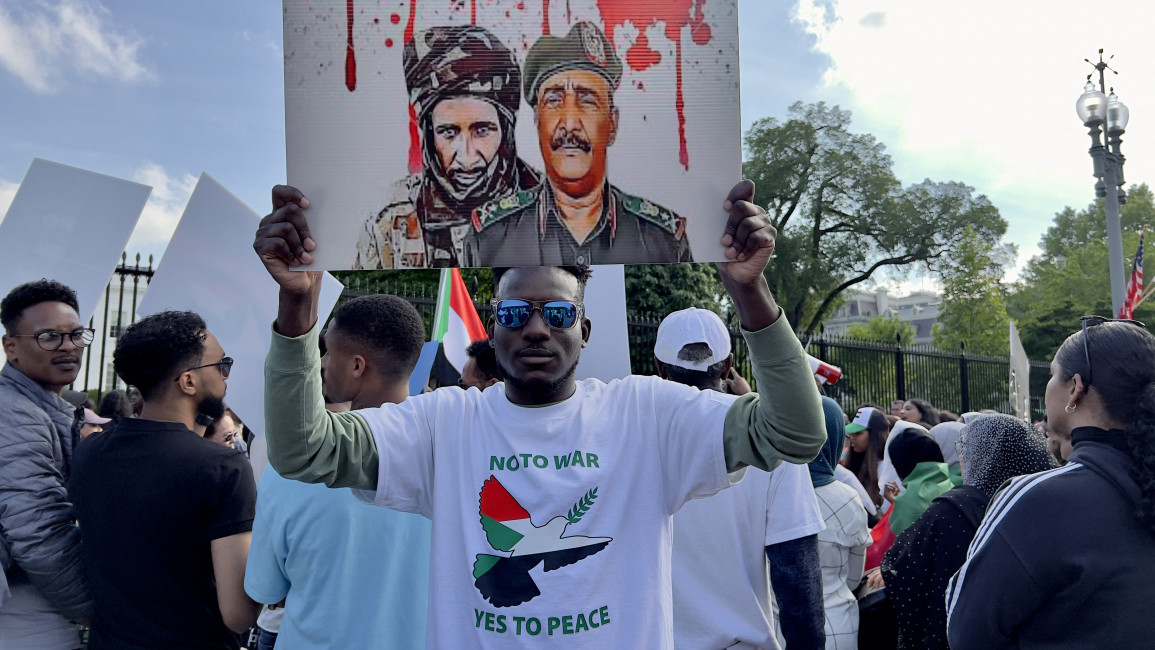
Sudan truce negotiations are just a mirage in the desert
The news over the past two days about the failure of the declared truce between the Sudanese army and the paramilitary Rapid Support Forces (RSF) to hold in the face of the inferno of war and madness raging in our country is very sad.
The reason for the sadness is not the wishful aspirations for success from the tampering that took place in Jeddah. Rather, the real reason for the sadness is the state of frustration and disappointment that afflicted the hopes of a large segment of our people to restore a sense of safety, albeit partially and temporarily, which was increased by the false news of the truce.
Siding with one of the parties to the conflict in repeating and disseminating their stories of who breached the truce first is useless.
What is proven is that the armistice that was signed with American-Saudi mediation in Jeddah at the beginning of this week is in critical care, if not at God’s mercy. The fictional stories about the ‘advanced monitoring mechanisms’ that would oversee the truce and Blinken’s verbal threatening antics did not succeed in making it hold for even for several hours, let alone seven days.
"What is happening in Jeddah is based on a wrong analysis and a wrong approach that gradually legitimises the accomplices of the two crimes of the coup in 2021 and the war in 2023"
What should be paid attention to are the risks and futility of the US-Saudi mediation efforts in their current form and their dangerous role in diverting attention from the seriousness of the situation in Sudan by manufacturing the illusion that they are doing something to remedy the conflict.
Both sides of the conflict were not serious in their play in Jeddah. From the beginning, the significance of sending negotiating delegations there was composed of non-institutional decision-makers in each.
The Declaration of Principles that was signed at the beginning of this mediation that negotiated the principles of international humanitarian law, which were not adhered to before nor after signing, failed to identify and hold the perpetrators accountable. This in turn invites them to commit more violations, taking advantage of the fact that all previous six truces have carried no repercussions.
In-depth: Amid a flurry of mediation offers by regional and international parties, a US-Saudi initiative is at the forefront of efforts to end the fighting, having engaged both warring sides and proposing a three-stage solution to restore calmhttps://t.co/vQ71LkzxRe
— The New Arab (@The_NewArab) May 3, 2023
All of this is sufficient evidence that what is happening in Jeddah is just a matter of dust in the eyes and protocol ceremonies with signatures that are not worth the ink that blackened the papers of their agreements.
Still, this is a very dangerous dust, and it puts the lives of civilians in danger by creating a false reassurance, as well as a state of complacency among other international actors in seeking to push for a solution to the disaster of the war in Sudan.
The shadow cannot be straightened while the stick is crooked, and what is happening in Jeddah is based on a wrong analysis and a wrong approach that gradually legitimises the accomplices of the two crimes of the coup in 2021 and the war in 2023 and the causal relationship between the two.
This will only lead to prolonging the war in a situation in which each party seeks to achieve progress through advancements on the ground by any means that give him preferential advantages at the negotiation table, which is accepting the legitimisation of political crime and impunity.
The rule of "the strong will prevail", which prevailed during the medieval dark age kingdoms in Europe and the reign of the Mamluks in our region, is not suitable to be the rule that determines the fates of modern states.
However, it still seems to be the ideology of Molly Phee, the top US diplomat for Africa, who coddles the generals because of their military might. It may be that US US foreign policy considers African conflicts only worthy of the rules of medieval times.
At the very least, what countries of the region and the international community must do if they fail to provide solutions that help to resolve the situation in a real way is to stop causing more harm.
As for the free chants of encouragement and cheerleading offered for this frivolity by some Sudanese political forces, hoping for a seat or a place at a future negotiating table that may lead to the formation of a government in which they can participate, it is a betrayal of oneself and the homeland.
The duty of these forces and all Sudanese patriots now is to present Sudanese narratives based on their local knowledge, realities and lived experience of what is happening to direct the mediation efforts of the international community to address the crisis rather than just applauding everything that bears the stamp of external forces that they think they may influence the formation of the future political scene in Sudan.
It is not enough to disband the RSF without actual reform to the military, and the RSF cannot continue to exist even if the military is reformed. A true solution must adhere to the fundamental principle that was summed up eloquently by the valiant slogan of the revolution: "The military backs to the barracks, and the Janjaweed should disband!”
Amgad Fareid Eltayeb is the CEO of the Sudanese political think tank: Fikra for Studies and Development. He previously served as the Assistant Chief of Staff to the Prime Minister of Sudan Dr. Abdalla Hamdok during the transitional period following the toppling of the Islamic dictatorship in Sudan.
Follow him on Twitter: @amjedfarid
Have questions or comments? Email us at: editorial-english@newarab.com
Opinions expressed in this article remain those of the author and do not necessarily represent those of The New Arab, its editorial board or staff.



